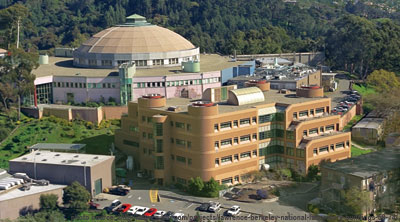
美国劳伦斯伯克利国家实验室计算算法博士后职位
Computational Algorithms Postdoctoral Fellow
Lawrence Berkeley National Laboratory
Description
Lawrence Berkeley National Lab’s ( LBNL) Computational Research Division has an opening for a Computational Algorithms Postdoctoral Fellow to join the team.
In this exciting role, you will develop highly parallel linear and multilinear algebra algorithms and implement them on the leading pre-exascale and exascale platforms. The postdoc will participate in various research activities funded through the DOE’s Scientific Discovery through Advanced Computing (SciDAC) project and the Exascale Computing Project (ECP).
What You Will Do:
Develop distributed low rank tensor algorithms, such as factorization and contractions, to solve tensor equations on CPUs and GPUs, for large-scale electronic structure calculations to model chemical reaction and dynamics in non-equilibrium systems.
Develop next-generation sparse factorization based linear solvers and preconditioners for multi-node GPU platforms, for a broad range of scientific and engineering problems.
Apply the new low rank based fast linear and multilinear algebra algorithms in scientific machine learning applications.
Interact with the physical scientists to deploy the new algorithms in modeling and simulation software.
Document work and results in the form of journal papers and conference proceedings.
Present work and results at scientific conferences.
What is Required:
PhD degree, within the last 3 years, in applied math, computer science, statistics, or computational science.
Knowledge of linear and multilinear algebra, low rank approximation, sparse direct methods, hierarchical matrix methods.
Experience in parallel programming in high-level languages, such as C/C++, MPI, and OpenMP.
Ability to work independently and collaboratively in an interdisciplinary team.
Desired Qualifications:
Experience in GPU programming, such as CUDA.
Experience in programming with both dense and sparse matrix data structures.
Knowledge of statistical and machine learning algorithms .
Notes:
Postdoctoral Scholars – This is a full-time 2 year, postdoctoral appointment with the possibility of renewal based upon satisfactory job performance, continuing availability of funds and ongoing operational needs. You must have less than 3 years of paid postdoctoral experience. Salary for Postdoctoral positions depends on years of experience post- degree.
This position is represented by a union for collective bargaining purposes.
Salary will be predetermined based on postdoctoral step rates.
This position may be subject to a background check. Any convictions will be evaluated to determine if they directly relate to the responsibilities and requirements of the position. Having a conviction history will not automatically disqualify an applicant from being considered for employment.
This position may be remote initially but limited to individuals residing in the United States tentatively until 2022 due to COVID-19. Once the Bay Area shelter-in-place restrictions are lifted, work will be primarily performed at Lawrence Berkeley National Lab, 1 Cyclotron Road, Berkeley, CA.
Lawrence Berkeley National Laboratory
Description
Lawrence Berkeley National Lab’s ( LBNL) Computational Research Division has an opening for a Computational Algorithms Postdoctoral Fellow to join the team.
In this exciting role, you will develop highly parallel linear and multilinear algebra algorithms and implement them on the leading pre-exascale and exascale platforms. The postdoc will participate in various research activities funded through the DOE’s Scientific Discovery through Advanced Computing (SciDAC) project and the Exascale Computing Project (ECP).
What You Will Do:
Develop distributed low rank tensor algorithms, such as factorization and contractions, to solve tensor equations on CPUs and GPUs, for large-scale electronic structure calculations to model chemical reaction and dynamics in non-equilibrium systems.
Develop next-generation sparse factorization based linear solvers and preconditioners for multi-node GPU platforms, for a broad range of scientific and engineering problems.
Apply the new low rank based fast linear and multilinear algebra algorithms in scientific machine learning applications.
Interact with the physical scientists to deploy the new algorithms in modeling and simulation software.
Document work and results in the form of journal papers and conference proceedings.
Present work and results at scientific conferences.
What is Required:
PhD degree, within the last 3 years, in applied math, computer science, statistics, or computational science.
Knowledge of linear and multilinear algebra, low rank approximation, sparse direct methods, hierarchical matrix methods.
Experience in parallel programming in high-level languages, such as C/C++, MPI, and OpenMP.
Ability to work independently and collaboratively in an interdisciplinary team.
Desired Qualifications:
Experience in GPU programming, such as CUDA.
Experience in programming with both dense and sparse matrix data structures.
Knowledge of statistical and machine learning algorithms .
Notes:
Postdoctoral Scholars – This is a full-time 2 year, postdoctoral appointment with the possibility of renewal based upon satisfactory job performance, continuing availability of funds and ongoing operational needs. You must have less than 3 years of paid postdoctoral experience. Salary for Postdoctoral positions depends on years of experience post- degree.
This position is represented by a union for collective bargaining purposes.
Salary will be predetermined based on postdoctoral step rates.
This position may be subject to a background check. Any convictions will be evaluated to determine if they directly relate to the responsibilities and requirements of the position. Having a conviction history will not automatically disqualify an applicant from being considered for employment.
This position may be remote initially but limited to individuals residing in the United States tentatively until 2022 due to COVID-19. Once the Bay Area shelter-in-place restrictions are lifted, work will be primarily performed at Lawrence Berkeley National Lab, 1 Cyclotron Road, Berkeley, CA.













